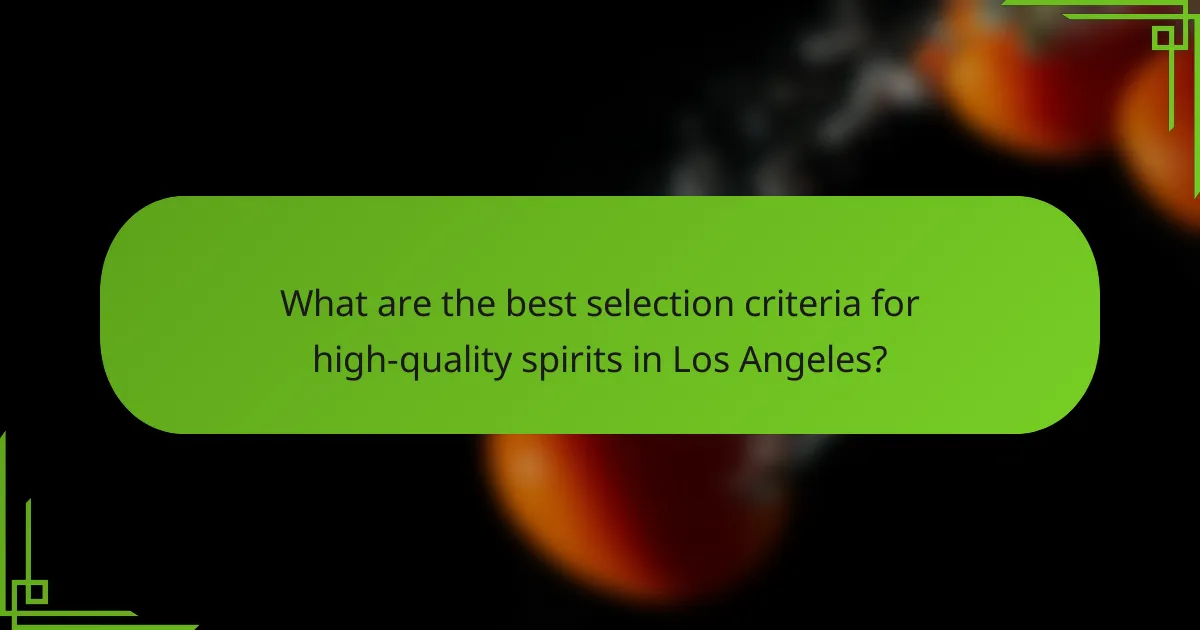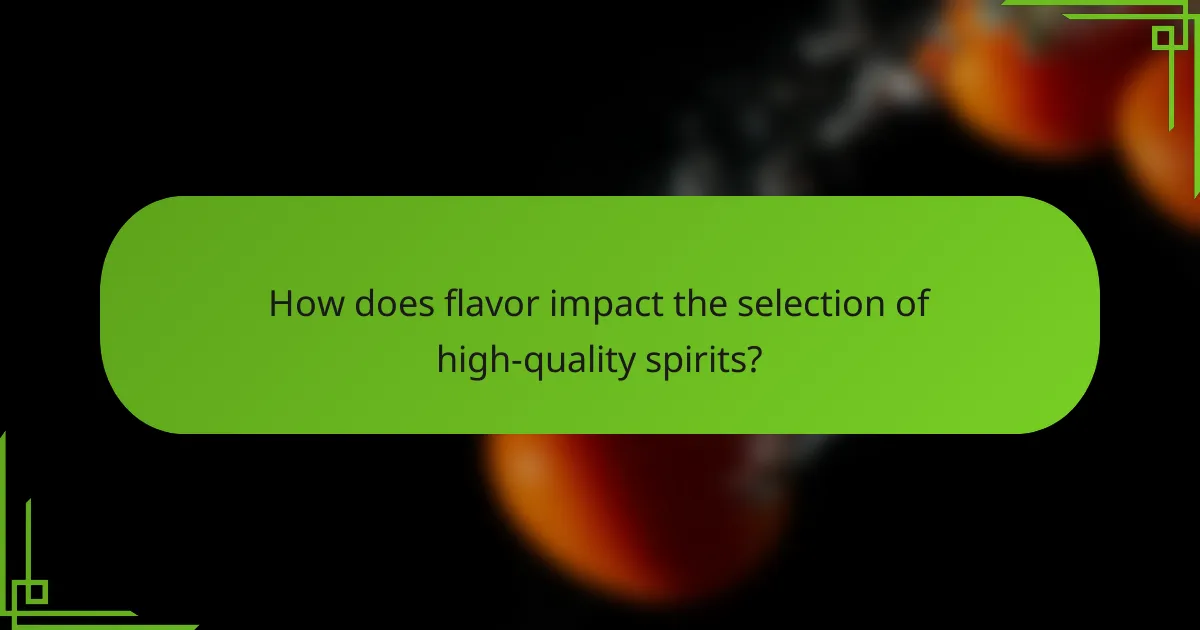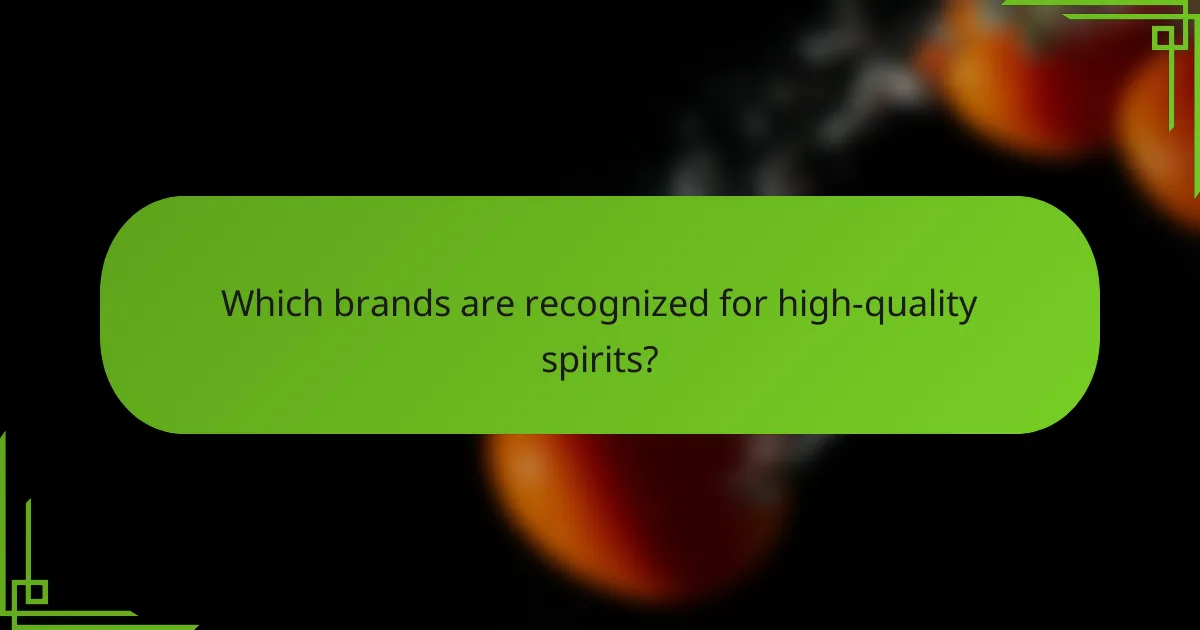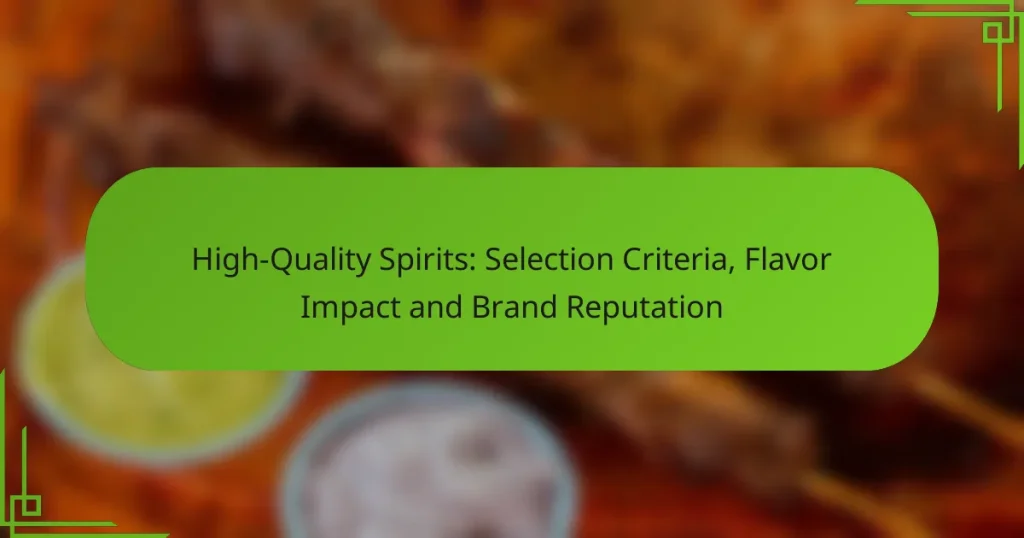When selecting high-quality spirits, several key criteria come into play, including the quality of ingredients, distillation methods, aging techniques, and brand reputation. These factors not only shape the flavor profiles but also enhance the overall drinking experience. Consumers often gravitate towards brands known for their craftsmanship and consistency, which are essential in delivering distinct and complex flavors that reflect their heritage and production excellence.

What are the best selection criteria for high-quality spirits in Los Angeles?
The best selection criteria for high-quality spirits in Los Angeles include the quality of ingredients, the distillation process, aging techniques, flavor profiles, and brand reputation. Each of these factors significantly influences the overall quality and enjoyment of the spirit.
Ingredients and sourcing
High-quality spirits begin with premium ingredients. Look for spirits made from organic grains, fresh fruits, or pure water sourced from reputable locations. The sourcing of these ingredients can greatly affect the flavor and authenticity of the final product.
In Los Angeles, many distilleries emphasize local sourcing, which can enhance the character of the spirit. Supporting local producers not only ensures freshness but also contributes to the regional economy.
Distillation process
The distillation process is crucial in determining the purity and strength of the spirit. Traditional methods, such as pot still distillation, often yield richer flavors compared to continuous column distillation. Understanding the distillation method can help you gauge the quality of the spirit.
When selecting spirits, inquire about the distillation process used by the producer. A transparent approach to distillation often indicates a commitment to quality.
Age and maturation
Age and maturation significantly impact the flavor and complexity of spirits. Many high-quality spirits, like whiskey and rum, benefit from aging in barrels, which imparts unique flavors and aromas. Generally, longer aging periods can enhance the spirit’s character.
In Los Angeles, you may find a range of aged spirits, from those aged for a few years to those with decades of maturation. Be aware that age does not always equate to quality; tasting notes and personal preference play a vital role.
Flavor profile
The flavor profile of a spirit is essential for determining its quality and suitability for your palate. High-quality spirits often exhibit a balance of flavors, including sweetness, bitterness, and acidity, along with complex aromas. Tasting notes can guide you in selecting spirits that align with your preferences.
When exploring spirits, consider trying tasting flights or samples to better understand their flavor profiles. This approach allows you to compare different brands and styles effectively.
Brand reputation
Brand reputation is a key indicator of quality in the spirits industry. Established brands often have a history of producing high-quality products and are recognized for their craftsmanship. Researching brand reviews and awards can provide insight into their standing in the market.
In Los Angeles, many local distilleries are gaining recognition for their innovative approaches and quality offerings. Supporting reputable brands can enhance your overall experience and ensure you are selecting high-quality spirits.

How does flavor impact the selection of high-quality spirits?
Flavor is a crucial factor in selecting high-quality spirits, as it directly influences the overall drinking experience. Consumers often seek distinct and complex flavors that reflect the quality of ingredients, production methods, and aging processes.
Influence of ingredients
The choice of ingredients significantly affects the flavor profile of spirits. High-quality spirits typically use premium grains, fruits, or botanicals, which contribute to richer and more nuanced flavors. For example, a whiskey made from organic barley may have a smoother taste compared to one made from lower-quality grains.
Additionally, the source of water used in production can impact flavor. Pure, mineral-rich water often enhances the overall quality of the spirit, making it more desirable. When selecting spirits, consider those that highlight their ingredient sourcing as a mark of quality.
Role of aging
Aging plays a vital role in developing the flavor of spirits. During the aging process, spirits interact with the wood of the barrels, which imparts additional flavors and aromas. For instance, bourbon aged in charred oak barrels can develop notes of vanilla and caramel.
The duration of aging also matters; spirits aged for several years often exhibit more complexity than those aged for a shorter time. However, over-aging can lead to excessive woodiness, so finding a balance is key. Look for spirits that specify their aging period to gauge flavor depth.
Impact of distillation methods
The distillation method used can greatly influence the final flavor of the spirit. Traditional pot still distillation often results in a fuller-bodied spirit with more character, while column still distillation typically produces a cleaner, lighter product. Each method has its advantages depending on the desired flavor profile.
When evaluating spirits, consider how the distillation process is described. Brands that emphasize artisanal methods or unique techniques often produce more distinctive flavors. Understanding these methods can guide you in selecting spirits that align with your taste preferences.

Which brands are recognized for high-quality spirits?
Several brands are widely acknowledged for producing high-quality spirits, characterized by their craftsmanship, flavor profiles, and consistent quality. Notable names often come from regions known for specific types of spirits, such as whiskey from Scotland or gin from the UK.
Top whiskey brands
Leading whiskey brands include Glenfiddich, Macallan, and Jameson, each known for their unique production methods and flavor profiles. Glenfiddich offers a range of single malts, while Macallan is celebrated for its sherry cask aging, and Jameson is a staple in Irish whiskey with its smoothness and versatility.
When selecting whiskey, consider the age statement, which often indicates quality, and the type of cask used for aging, as this significantly impacts flavor. Aged whiskeys typically range from three to over twenty years, with older varieties often commanding higher prices.
Renowned gin producers
Prominent gin producers include Tanqueray, Bombay Sapphire, and Hendrick’s, each offering distinct botanical blends that define their flavor. Tanqueray is known for its classic London Dry style, while Bombay Sapphire features a more floral profile, and Hendrick’s incorporates cucumber and rose for a unique twist.
When choosing gin, look for the type of botanicals used and the distillation process, as these elements greatly influence taste. Premium gins often retail between $30 and $60, reflecting their quality and craftsmanship.
Leading rum distilleries
Top rum distilleries include Mount [censured], Ron Diplomático, and Bacardi, each with a rich history and diverse offerings. Mount [censured] is recognized for its Barbados rum, Ron Diplomático for its Venezuelan varieties, and Bacardi for its wide range of light and dark rums.
When selecting rum, consider the origin, aging process, and whether it is a light or dark variety, as these factors affect flavor and use in cocktails. Quality rums can range from $20 to over $100, depending on age and brand reputation.

What are the pricing bands for premium spirits in California?
In California, premium spirits typically range from around $20 to over $200, depending on the brand and quality. This pricing structure reflects the diverse selection available, catering to various budgets and preferences.
Budget-friendly options
Budget-friendly premium spirits in California generally fall between $20 and $50. These options often include well-known brands that offer good quality without breaking the bank. Look for popular choices like certain vodkas, rums, and blended whiskies that provide solid flavor profiles at accessible prices.
When selecting budget-friendly spirits, consider exploring local distilleries, as they may offer unique products at competitive prices. Always check for sales or promotions to maximize value.
Mid-range selections
Mid-range premium spirits are typically priced from $50 to $100. This category includes artisanal brands and small-batch distilleries that focus on quality ingredients and craftsmanship. You can find excellent single malts, craft gins, and premium tequilas in this range.
For a well-rounded experience, consider tasting flights or sampler packs that allow you to explore different flavors within this price band. This can help you identify your preferences without committing to a full bottle.
Luxury brands
Luxury premium spirits in California usually start at $100 and can exceed $200 or more. These brands often feature limited editions, aged products, or unique production methods that justify their higher price tags. Examples include rare whiskies, high-end cognacs, and exclusive rums.
When investing in luxury spirits, look for reputable brands with strong heritage and positive reviews. Consider purchasing from specialty retailers or directly from distilleries to ensure authenticity and quality.

What permits are required for selling high-quality spirits locally?
To sell high-quality spirits locally, you typically need a combination of state and local permits. These licenses ensure compliance with alcohol regulations and vary by jurisdiction.
State licensing requirements
Each state has its own licensing requirements for selling spirits, which often include obtaining a retail license, a wholesale license, or both. The application process may involve background checks, fees that can range from hundreds to thousands of dollars, and adherence to specific state regulations regarding alcohol sales.
For example, many states require sellers to demonstrate knowledge of responsible alcohol service and may mandate training programs for staff. It’s crucial to check your state’s alcohol control board or commission for detailed guidelines and necessary documentation.
Local regulations in Los Angeles
In Los Angeles, selling high-quality spirits requires a local business license in addition to state permits. The city enforces strict zoning laws that dictate where alcohol can be sold, which may limit options based on proximity to schools or places of worship.
Additionally, applicants must comply with the California Department of Alcoholic Beverage Control (ABC) regulations. This includes submitting a detailed application, paying applicable fees, and potentially undergoing a public hearing if objections arise from the community. Understanding these local nuances is essential for a successful application process.

How does brand reputation affect consumer choices?
Brand reputation significantly influences consumer choices in the high-quality spirits market. A strong reputation often correlates with perceived quality and reliability, leading consumers to prefer brands they trust over lesser-known options.
Consumer trust factors
Trust in a brand is built through consistent quality, transparency, and positive experiences. Consumers are more likely to choose spirits from brands that have established a history of excellence and ethical practices. Factors such as age, awards, and production methods can enhance a brand’s credibility.
For example, a distillery that openly shares its sourcing and production processes may foster greater trust among consumers. Additionally, brands that engage in sustainable practices often attract consumers who value environmental responsibility.
Impact of reviews and ratings
Online reviews and ratings play a crucial role in shaping brand reputation. Positive feedback can enhance a brand’s image, while negative reviews can deter potential buyers. Many consumers rely on platforms like social media and review sites to gauge the quality of spirits before making a purchase.
It’s beneficial for brands to actively manage their online presence by responding to reviews and addressing concerns. A high average rating, especially from reputable sources, can significantly boost consumer confidence and lead to increased sales.


